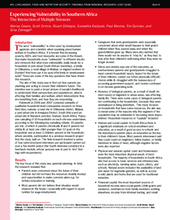This research brief aims to highlight the key purpose, results and arguments from a research study aimed at understanding the meaning of vulnerability in the development context in South Africa and Malawi. Specifically, the study aims to find out how parents are planning and acting to secure their children’s future.
This research was conducted in 2006 and 2007 through a qualitative household-level comparative field study in a rural site in Chikwawa district, Malawi, a peri-urban site in Amajuba District, South Africa and an urban site in Warwick Junction, Durban, South Africa.
The research revealed the following results in relation to parental planning:
-
despite parental concern for children, parents are unable to make concrete plans due to lack of resources
-
grandparents caring for their grandchildren were concerned about what would happen once they passed away
-
the absence of biological parents, either due to death or migration, was affecting family life
-
there is some access to human and social capital due to significant emphasis on schooling and social support structures
-
physical capital, like land and homesteads, is critical. Access to basic services and infrastructure is good, and natural assets like land and water are available
-
there is the presence of important financial capital, including social grants, remittances, income from informal trading and small income-generating activities
-
other challenges included harsh climatic conditions, tension between household members, AIDS and other illnesses
-
there is a need for greater emphasis on schooling in South Africa than in Malawi.
The conclusions of the study suggest that people were aware of the threats to their welfare and of their limited options to sustain families and livelihoods. Families not able to improve their living conditions and are always under threat. Some families were able to invest in children’s education and houses. These investments, however, were found to be lacking in providing children’s stable existence. These factors point to a widening gap between rich and the poor in South Africa.
©International Food Policy Institute

